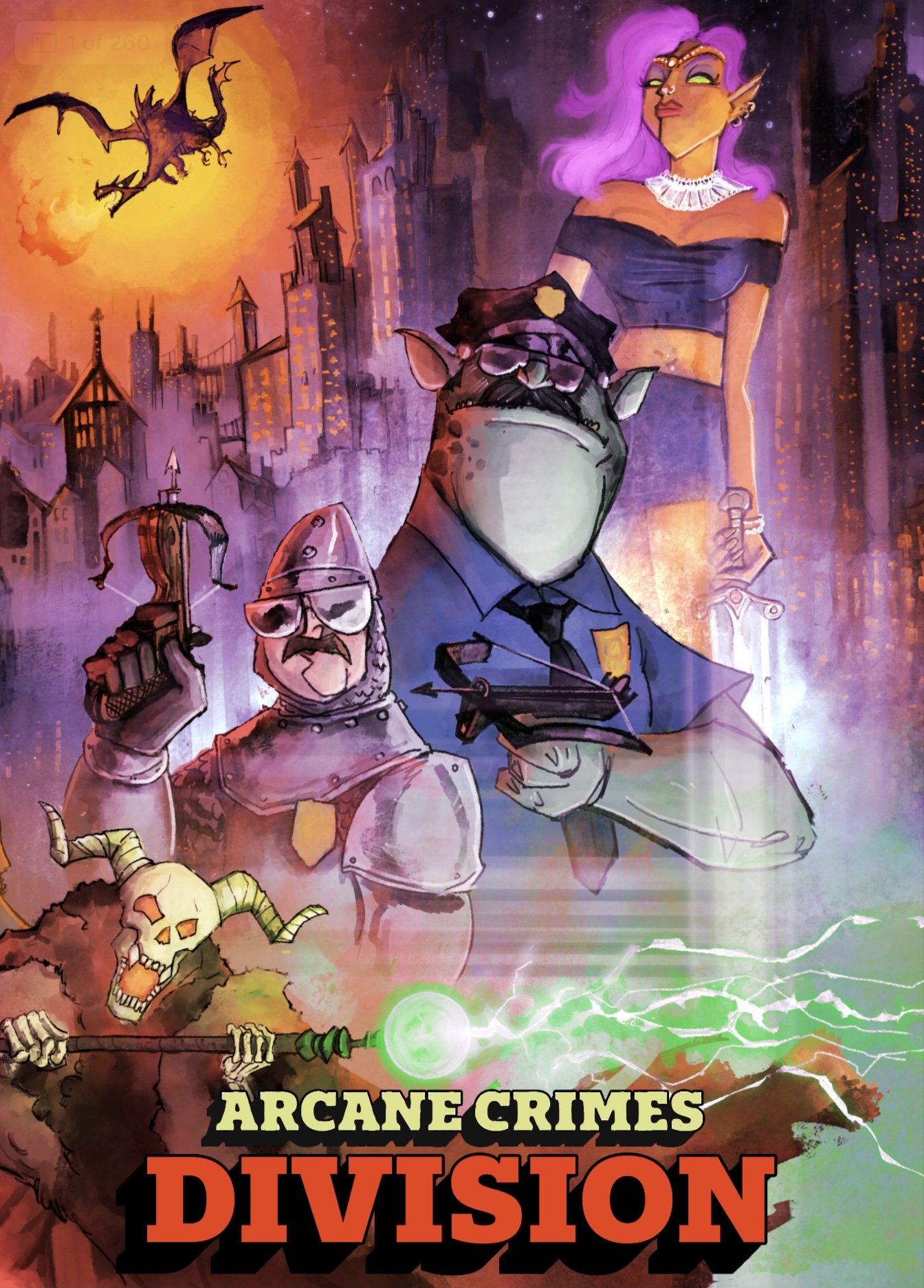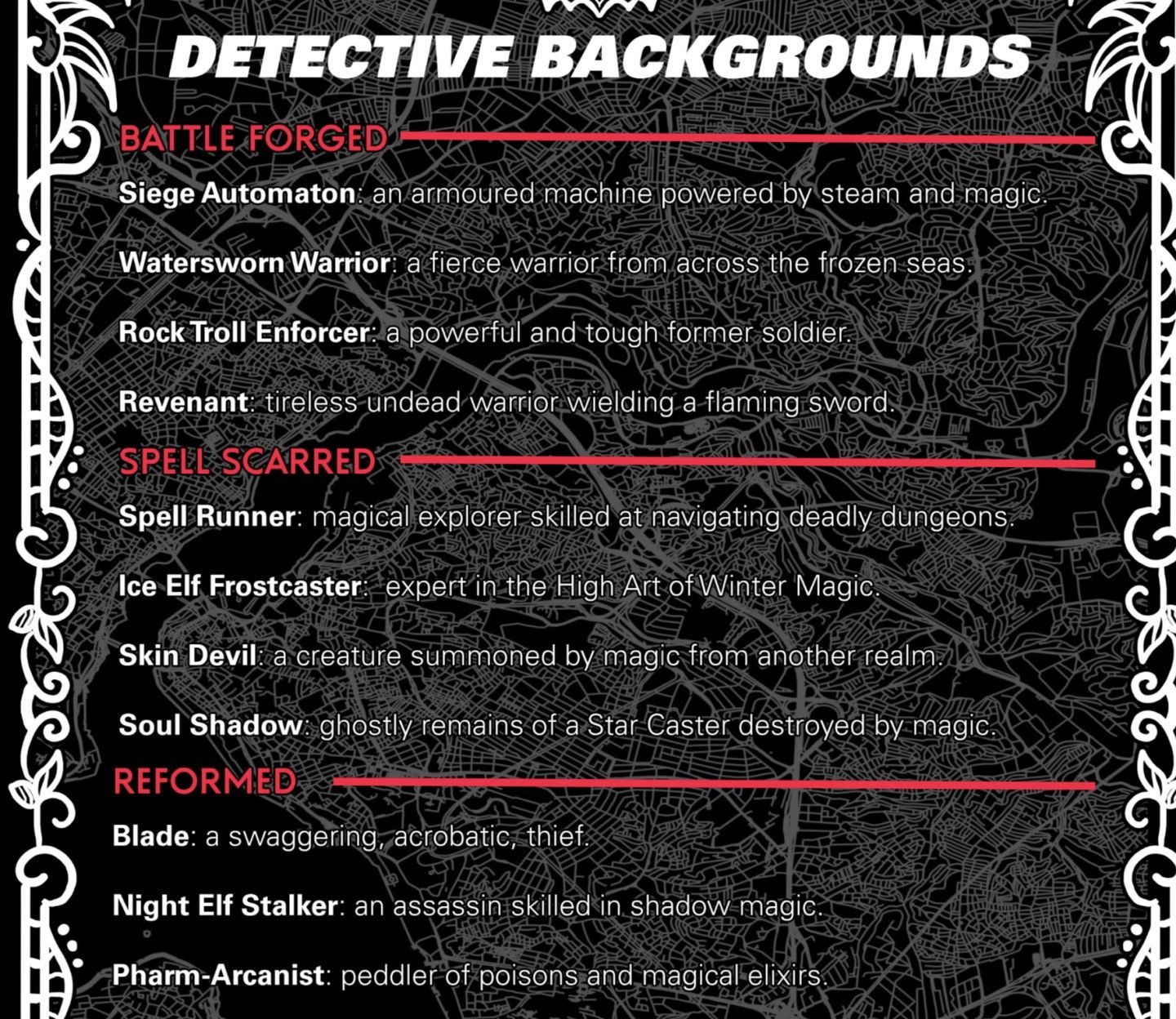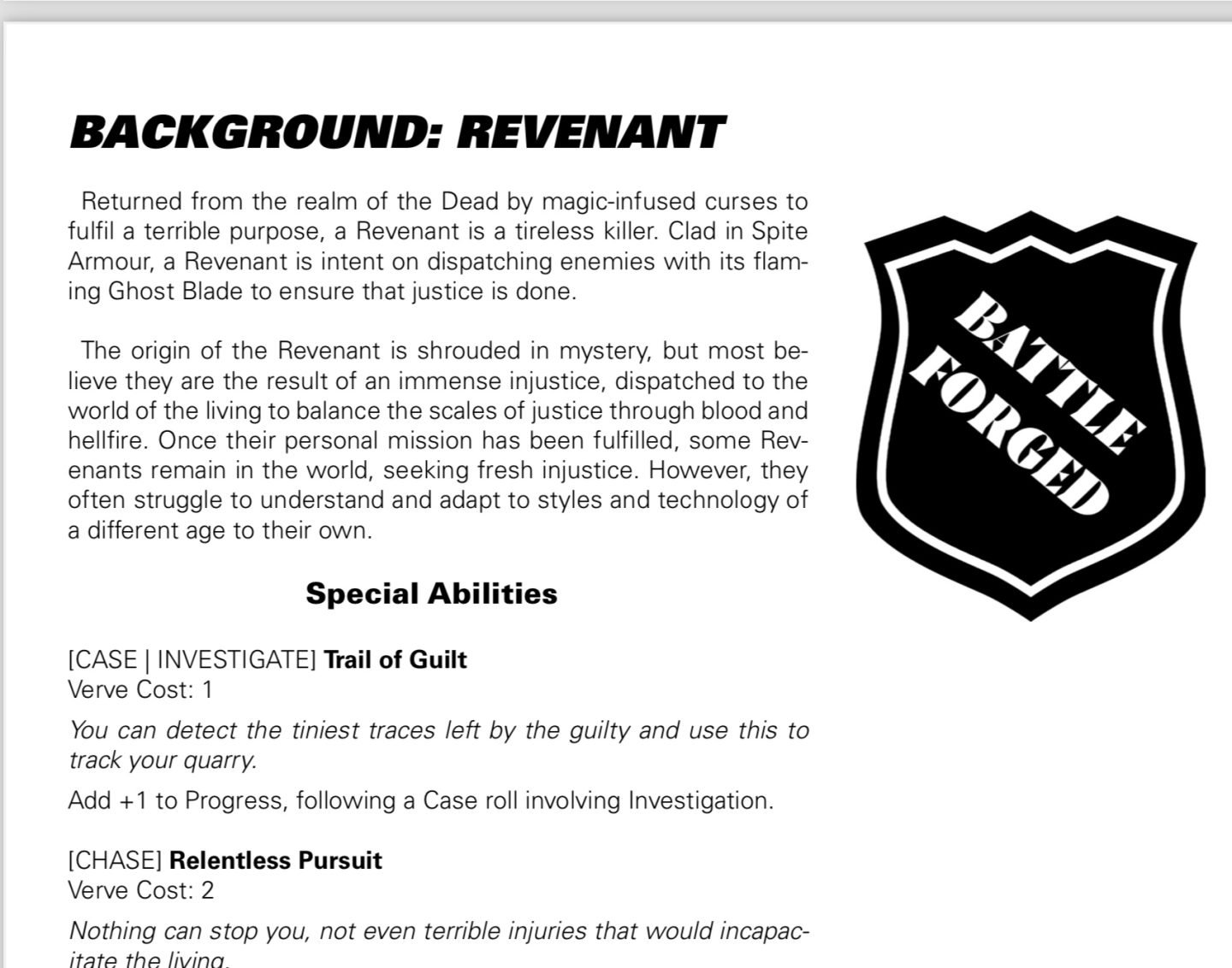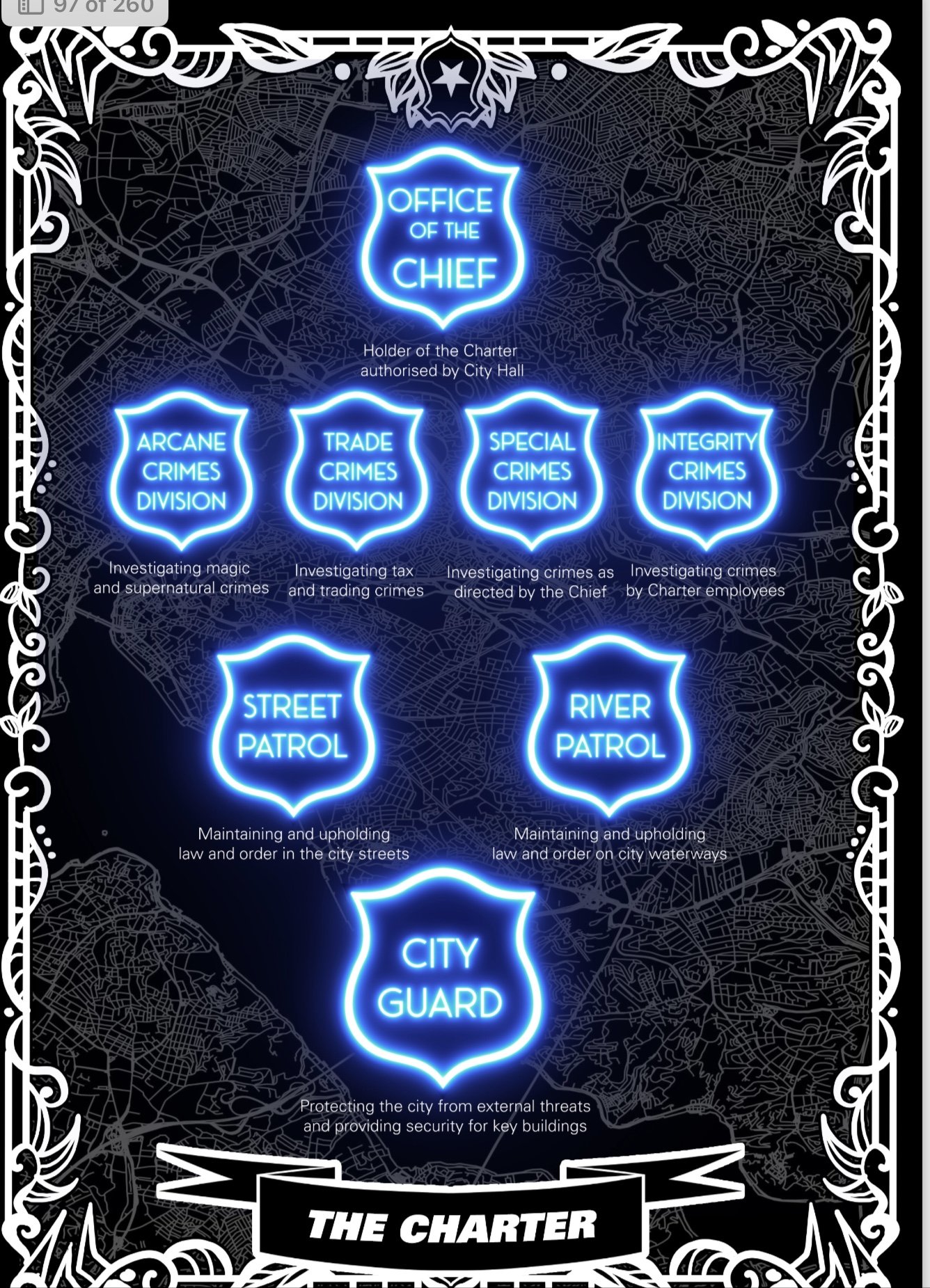Publisher: Imaginary Empire Games
Year Published: Casebook for the Arcane Crimes Division RPG (on Kickstarter for 4 more days!)
Arcane Crimes Division brings light-hearted buddy-cop style action to a fantasy city bursting with magic and thick with scheming villains and ruthless scoundrels. The focus of the game is the relationship between detectives, as they crack cases, engage in thrilling chases, and confront criminal masterminds.
Disclaimer: The publisher provided the PDF copy of Arcane Crimes Division RPG. The opinions expressed in the review are completely my own.
Review:
I recently opted to do a preview for Arcane Crimes Division after coming across it and thinking it was presenting a system to incorporate existing Dungeons and Dragons classes and characters into a more modern and contemporary setting.
Alas, I have had to endure the sudden and sharp realization that no, this is not a new way to implement your characters into a 5E setting. How and why I came to the conclusion that I did is beyond my ability to explain as I write this review, as I am truly dumbfounded.
However, that is not to say my previewing the material was a complete loss, not at all. In fact after reading through the some 200+ pages of content, I am finding myself quite inspired to try the system out.
In a nutshell, this is not any sort of expansion or add on ; it is a fully self-contained system that allows you to role play members of a sort of modern, cyberpunk FBI agency whose sole job is to investigate illegal magic use.
This is the theme that I remember seeing for Arcane Crime Division (ACD)when I first saw it, thinking that this may perhaps have a modern day DnD Barbarian trying to infiltrate the Red Wizards of Thay or some other silly thing, but no, this is a totally new role-playing concoction that is oozing with its own creative essence.
As a detective of the ACD, you will create a character with one of four main specializations, including :
Battle-Forged
Spell-Scarred
Reformed
Enlisted
These are best described as a basic sort of roles that your skill set generally excels at. If this were DnD, I am not sure what I would call these roles, they aren’t classes, or even backgrounds, nor are they races. The best I can summarize these roles would be very broad character tropes, because they can encompass quite a lot, even within being a “scant” 4 specializations…
After that, you then choose a “background”. And this is where things get really interesting…
Because of my usual affinity with DnD builds, I typically associate “Backgrounds” with boring…
Because the 5E “perks” of your background usually just include a cantrip, set of thieves tools, a small dagger, or some other trivial things that do not feel like it defines your character, nor does it contribute to the sense of your character’s essence and development.
In Arcane Crime Division, the sense of “background” feels much more extraordinary.
The backgrounds essentially allow you to be…
A mech?!
An undead zombie?!
A vampire?!
If this were DnD, I would say that “Backgrounds” in ACD feel more like classes, but they are not. They really feel like the essence of your character and what it is capable of becoming in the long run. The background has all sorts of crazy things that can develop such as ability to merge parts onto your mech body that allow you to imitate specialized roles of other mechs for grand deceptions, and more. Or fiery dragon breath that gets more potent over time (for better , and for worse!).
This game is not meant for solo at all in my eyes. It is meant to be a game of teamwork, a cyberpunk pairing of duos in true Men in Black Fashion, where Will Smith’s and Tommy Lee Jones’ personas almost become essential to taking on the calamities of the city of Polarity, where you will be spying out various syndicates in efforts to topple their regimes.
Firstly, let’s get this out of the way : You will need a sort DM (in this game, called the Facilitator), that will act as a sort of “chief of police” in addition to storyteller and handler of various NPC’s you will encounter.
Each player will start their “day” together in a sort of briefing room and have a chance to perform some unique tasks that can only be done in this particular phase. After that, you will each proceed to go about handling new cases that come across your desk.
And herein lies one of the more controversial aspects of design : You will need to play out a game “day” by splitting up into three separate 2-member teams, meaning there will be downtime for the other two teams while one is engaged with the Facilitator in an active case. (You can certainly play as multiple characters should you lack enough real people for 3 complete teams).
And I need to admit that I will need to actually get a group together to play this before passing judgement on this unique method of play. But after reading through the entirety of the instructions, I can see why this may not be as much of an issue as one may think.
Because as described, it would seem that there seems be a “flow” to this RPG system that allows for an elegant simplicity that, when seen as a whole, works.
The structure of the system after you start working on your cases revolves around this particular structure :
Team 1 handles their case
Team 2 handles their case
Team 3 handles their case.
Then, in an epic finale, the three teams join forces for an ultimate showdown against whomever they have (maybe) managed to implicate in some major, evil, scheme. Perhaps it was an elf-lord using magic to manipulate the odds in their favor in a Casino, or a mage who resurrects themselves to feign being a deity to their cult, and you manage to find evidence to show them to be involved in these (and other) major conspiracies. Now you need to haul them in (or die trying).
What makes Arcane Crime Division unique is that there is a story to be told. Yes, there is active DM / Facilitator work to be done, but the prep work is really pretty minimal from what I can tell, leading to a focus on fun. From the bits I have gathered, in fact, you could really run this game with close to zero preparation, which is quite an accomplishment for an RPG.
Part of this has to rather ironically deal with with sandbox nature of the game. And usually sandbox means it is a pain in the arse for DM’s, as player’s will often catch you off guard and do something unexpected. But in the world of ACD, virtually anything players think of seems like it can lead them to the clues that point them in the right direction
And this is thanks to a clever system of dice rolling using three D6’s that measures progress against time.
What this means is that whenever you take certain investigative actions, you will roll for both progress and time (I am simplifying things here). Certain outcomes of the roll will lead to adding points to your Progress meter while at the same time, you will be contributing to your Time spent investigating. If you ever fail to make enough progress in your case and go over a Time limit, well, bad things will happen. But eventually, you will make your way to …something, if not an Epic showdown.
The city of Polarity and its world is really well thought out, with various districts to explore. There are multiple scenarios, and there is a grand story arch that is presented that makes for compelling reasons to return to the table every week.
There are certainly a lot of great ideas here, everything from the way you can get demerits for causing too much destruction while chasing down foes, to a sort of tag-team mechanic that allows you to combo off of your teammates’ moves (in a method that feels quite evocative of Chrono Trigger’s dual/triple tech abilities).
I also like the way your abilities are powered using Verve points instead of something like spell slots per day. Verve essentially functions as MP / Mana Points and fuels various abilities, but I like the simplicity this brings in this particular context.
All-in-all, I am very impressed at what I am seeing so far in Arcane Crime Division. While I have reviewed a few other d6 systems in recent years, some of them feel perhaps a bit too open-ended. I know that the Broken Compass systems I have tried allows players to really take on any roles within the fantasy / action genre, but that particular game felt like it was very much tied too much to old movie tropes for example.
Others have been lacking on the role playing side, placing more emphasis on dungeon crawling.
ACD feels more…entertaining to me in reading it. It almost feels like taking on roles of Danny Glover and Mel Gibson in Lethal Weapon, or playing a game of good cop / bad cop , having great potential for a night of humor and laughs.
But it nevertheless doesn’t manage to feel obscene or R-rated, which is also something I find gives it some added value.
You can find links to their Kickstarter here, and since it is ending soon, please check it out if this sounds interesting! You can look forward to my full review when I get a chance to play it in the upcoming months!
Disclaimer: all images are owned and copyright by their respective owners and website (www.everythingboardgames.com) and “https://madcity.games/blog” is for news, information, product news and reviews.




